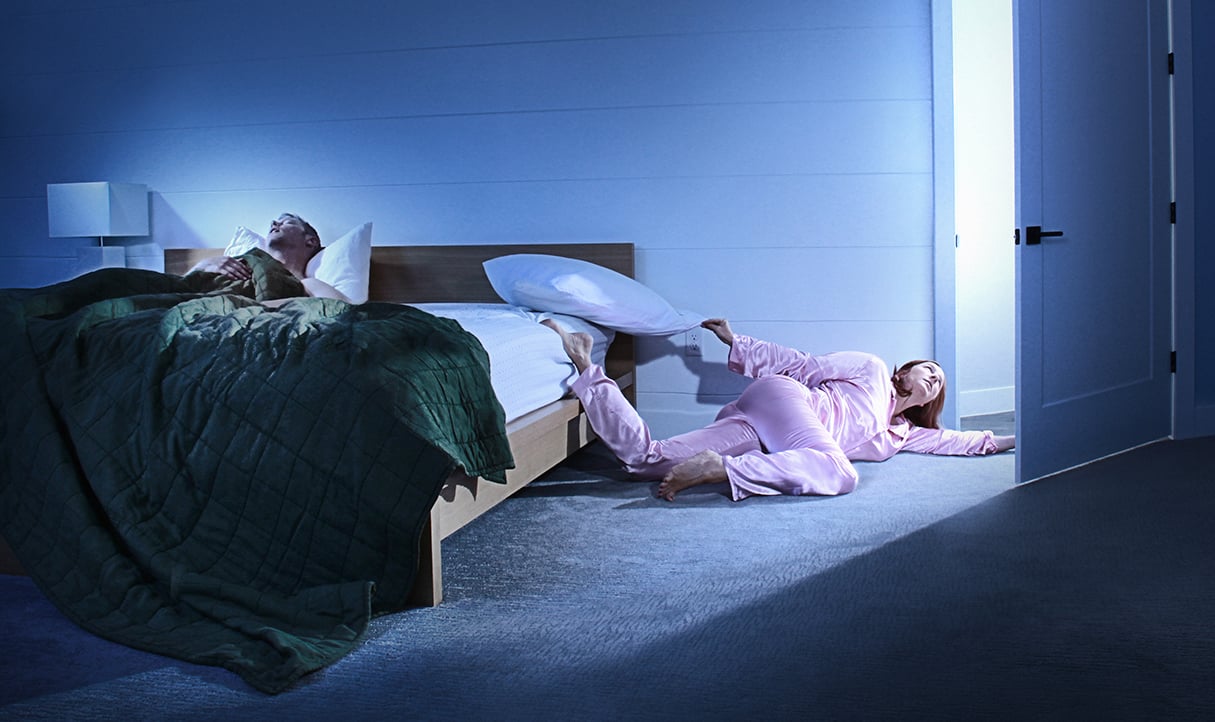Not so long ago, local small-business owner David Mason* made a fateful decision: Before he fell asleep, started snoring, and awakened his wife, he would leave their bedroom and move down the hall to the guest room for the rest of the night.
The change in Mason’s nighttime routine had been more than a decade in coming. His snoring had been an issue for years—keeping his wife sleepless and seething.
Jennifer Mason had a new baby and a full-time job as a defense-industry IT specialist when she first confronted David about his nighttime organ recital. He didn’t believe her at first.
“I said, ‘I’m not making it up,’” she recalls. “It literally made me rage. I felt like I could kill him with my bare hands.” If, that is, she could muster the energy after another sleepless night.
At one point after their daughter was born, Jennifer removed the baseball bat David kept under the bed for protection. She was worried she might clobber him one night when he kept her awake.
Opting for a more constructive tack, she marched him off to an otolaryngologist, who recommended surgery to remove David’s uvula, the fleshy extension of the soft palate that hangs over the back of the throat and can restrict the airway between nose and mouth.
After he had the operation, silence reigned in the Mason bedroom for more than a decade. Then David spontaneously started snoring again. Jennifer began buying earplugs in bulk.
What she didn’t do was insist he take his nocturnal foghorn down the hall for good. Having a surgeon take a scalpel to her husband’s throat was one thing; becoming one of those couples with different rooms was quite another. David now makes a voluntary exit every night.
“I hate not sleeping with him,” says Jennifer, 52. She associates separate bedrooms with her grandparents. “I’m too young for that.”
Today Jennifer feels better physically, and the dark circles under her eyes have disappeared. While she appreciates the peaceful sleep, she’s not ready to share the good news with friends. You might complain about a snoring husband, but sleeping separately is something many people aren’t even willing to admit to themselves.
The Masons have joined a population we might call the Shakers and Movers. By night, they shake their partners awake and move them to another room to get some sleep. By day, they maintain the joint bedroom as a shared space.

It’s a kind of bourgeois comedy of nighttime manners. Thus, even though Shakers and Movers make frequent use of the guest room, they avoid upgrading its mattress or outfitting it with a good reading light or functional alarm clock. A stack of current books on the guest-room nightstand? You know what that means.
One sleep-deprived wife says that when she finally gives up on trying to sleep with her noisy husband, she’s the one who picks up her pillow and moves. In the morning, she returns her pillow to her side of the marital bed. It’s the essence of Shaker and Mover behavioral convention: The spouse may sleep alone, but heaven forbid the bedding does the same. As long as her pillow spends the day in its rightful place, she doesn’t have to ponder the meaning of their separate sleeping arrangements.
It’s no wonder so many partners seek out the guest bed. Research actually backs up the anecdotal data from spouses like Jennifer Mason. Sharing a bed with a snorer can be hazardous to a mate’s health, according to the Mayo Clinic. The phenomenon is often called “secondhand snoring.” People who sleep with snorers may wake up nearly as often as the snorers themselves.
Researchers also have reported that people who slumber next to snorers have more pain complaints, have higher levels of fatigue, and may even be at risk for hearing loss—particularly in the ear closest to the snorer. For some, it’s like “sleeping next to an industrial machine for 10 to 15 years,” according to one colorful researcher at a Canadian university.
Sleeping apart, meanwhile, is free—and, according to people who study these things, a lot more common than your otherwise happily married friends might acknowledge. A 2012 survey by the Better Sleep Council, an Alexandria group that represents the mattress industry, found that 20 percent of American couples claim to keep to their own corners of the bed and nearly one in ten sleep in separate bedrooms. In 2013, a researcher from Canada’s Ryerson University said 30 to 40 percent of couples doze in separate beds.Inevitably, an industry has popped up to help partners sleep: A tennis-ball T-shirt has a pocket sewn onto the back to hold a ball, which makes sleeping on one’s back—a prime position for snoring—uncomfortable; an anti-snoring chin strap supports the jaw and keeps the mouth closed; a moldable mouthpiece pushes the lower jaw and tongue forward to keep snoring at bay. For bigger spenders, an $8,000 “superbed” is purported to work wonders on snoring.
When you consider the intricate stagecraft of Shaker and Mover life, it’s easy to see why the stats are all over the place. If one member of a couple just “happens to leave the bedroom” most nights, does it even count as separate bedrooms? When couples themselves are unsure, it’s hard to know what they’ll tell researchers.
All the same, with so many people spending so many nights outside the fairy-tale sanctity of the shared bed, you’d think the arrangement would be part of the popular conversation about marriage and intimacy. It’s not. Thanks in part to the Fifty Shades of Greying of American society, you can lay claim without shame to almost any sexual proclivity, but saying you sleep in separate beds—let alone separate rooms—still leads to raised eyebrows.
In 2007, the National Association of Home Builders projected that by this year the demand for custom homes with two master-bedroom suites would increase significantly. The report made news, but the predicted demand for dual masters never materialized. The NAHB’s 2013 survey of “what homebuyers really want” found that only 8 percent said two master suites were essential, though another 30 percent said the feature was “desirable.”

This isn’t to say plenty of families don’t acknowledge the regular musical-beds routine dictated by the rhythms of nightmares, sick kids, and other parental considerations. Rather, among the people interviewed for this story, it seems to be intent rather than effect that separates the embarrassing personal secrets from the workaday complications of family life.
If a four-year-old insists on sleeping with Mommy when she has a bad dream—meaning Daddy is consigned to spending the night between Hello Kitty sheets back in the kid’s room—it’s an example of Daddy being a good parent and makes for a funny story to tell the neighbors.
But if Daddy curls up with Hello Kitty because Mommy’s kicking leaves him black and blue and wide awake, that’s Daddy acknowledging that his marriage has become a sterile, sexless cohabitation—something to hide from even close friends.
Several women I spoke to expressed fear that leaving the marital bed leads inevitably to leaving the marriage. “That would feel like the first step to separation,” one said.

In part, this is because popular culture offers no model for successful couples who just happen to nod off in separate rooms. (Even stuffy TV aristocrats share beds: OnDownton Abbey, the Earl of Grantham might have his valet help him with his pajamas, but he still shares a bed with Lady G.)
That’s too bad, because some public conversation would help people work out an etiquette regarding marital bed-shifting. For instance: Who goes and who stays? Is the arrangement ad hoc or negotiated in the light of day? Several interviewees reported that it’s easier to change beds than to rouse a snoring, kicking, or sleep-talking bedmate.
“My husband pokes me and prods me, but I don’t wake up,” admits Tracy O’Connell of Springfield. “We have four cats, and a couple of times he put one of our cats on my head.” The only way both husband and wife get a good night’s sleep is if one of them spends the night in a living-room recliner, O’Connell says. Like a handful of those interviewed, the couple doesn’t have a spare bedroom.
A few others are able to propel restless spouses into separate beds without conscious assent. One long-married Virginian describes a workable compromise: She and her husband sleep together part-time.
“A couple nights of good sleep a week and I am a much nicer person to everyone, especially my spouse,” she says. “So we both think it’s worth being apart some. Absence does make the heart grow fonder! Maybe that’s where this saying originated.”
Is the Virginia couple right? Is a nocturnal relocation to the guest room a plus for a snore-traumatized relationship?
Alas, data from Professor Richard Wiseman of England’s University of Hertfordshire might add to the angst of sleep-deprived spouses. In a 2014 study, Wiseman concluded that “94 percent of couples who spend the night in contact with one another were happy with their relationship, compared to just 68 percent of those that didn’t touch.”
After talking to 1,000 couples, Wiseman determined that satisfaction can be measured in inches. Eighty-six percent of those who slept less than an inch apart claimed to be happy in their relationship, while only 66 percent of those who slept more than 30 inches apart could claim relationship satisfaction. (A night in the attic guest room can really skew the averages.)
Indeed, a lot of the couples I talked to felt that snoring was part of the wedding package—for richer, for poorer, in sickness and in health. There is no marriage vow for “till snoring do us part.”
But the real world has a significant amount of the condition. Nan Kaufman a clinical social worker in Bethesda, has seen many couples whose relationships were disturbed by interrupted sleep. Even when you know intellectually that your partner can’t help it, Kaufman says, it’s hard not to assign blame to the person keeping you up nights. Not surprisingly, sleep deprivation tends to make a person testy.
On the other hand, the disturbing sleeper can feel that his or her physical self is being criticized, Kaufman notes, which can make someone more self-conscious and defensive. “It doesn’t have to go down the road to a negative place,” she says. The best thing a spouse can do is to acknowledge the problem and express willingness to work on a solution.
Which is where the artifice at the core of the Shaker and Mover identity proves to be psychologically healthy: You can sleep separately and still maintain the myth of the master bedroom. Clothing, bedside reading material, cell phones, and other paraphernalia stay in place as if the occupant has just stepped away momentarily. The key is to move nothing but the body. And he or she will never tell.
Besides, says Kaufman, people who are worried about marital intimacy might find some upsides, too. “Sleeping together” doesn’t require sleeping together, she says: “Parents still find a way and a time to have sex even when sharing a family bed. If you feel awake, refreshed, and happier, you are more likely to find other ways and times to be intimate.”
*Names of snorers and their spouses have been changed to protect the sanctity of the marital bed.
Lifestyle editor Leslie Milk can be reached at lmilk@washingtonian.com
This article appears in our July 2015 issue of Washingtonian.


















